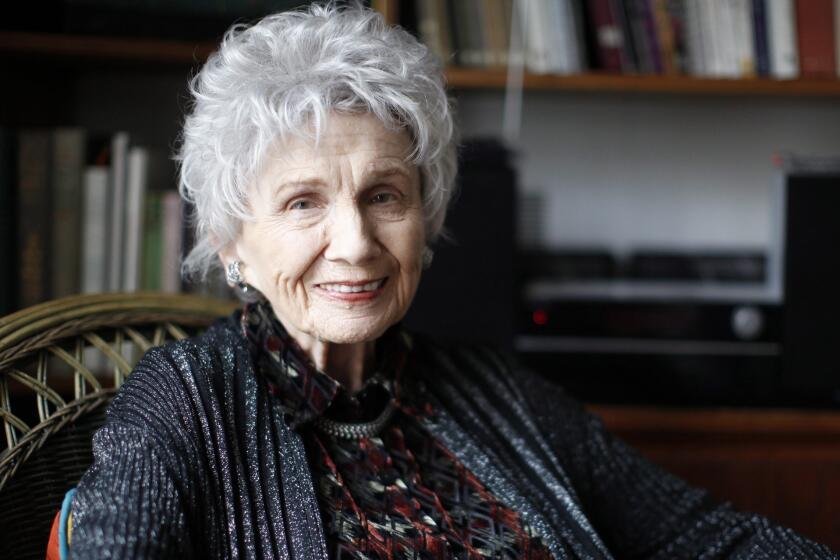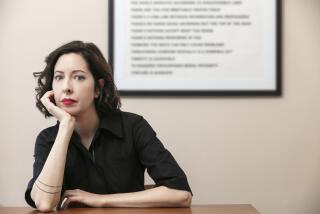Commentary: Alice Munro was no better than the miserable women she wrote about

If you lived wholly online and never talked to real people, you’d imagine there are only two camps: Those who can forgive any artist’s sins and take the art on its own terms as if it were shot from some cannon on Mt. Parnassus, and those who can never again consume the work of an artist who has done something they don’t approve of. The reality, of course, is much more muddled, and fraught, and heartrending.
When news broke this week of Alice Munro remaining with the man who’d sexually abused her daughter Andrea, of Munro apparently accepting his justifications for continued molestations — justifications that would make any abuse survivor, including this one, physically ill — writers and readers were faced with an all-too-familiar reckoning.
It was familiar because we’ve done this already, had to decide whether we can still read the books of a writer who has disappointed us profoundly as a human. But it was also familiar because the details sound uncannily like an Alice Munro story.
So much of Munro’s work was about someone forgiving someone else (especially a woman forgiving a man) for something unforgivable, or about making some other horrible compromise of the soul — and also about how wretched these compromises are, how doomed the forgivers are to live in the eternal purgatory of self-abrogation. Often, her characters don’t even fully understand what they’ve done.
Think of “Corrie,” in which the title character realizes that her lover has been duping her for years, pretending that the two of them are being blackmailed but taking the payoff money for his own family — and yet decides to do nothing. “She could say something that would destroy them,” Munro writes, “but she does not have to.”
As a great admirer of Munro’s craft (I’ve wondered often, alone or to my students, how she gets away with breaking so many rules, how she moves so freely through time and space and the human heart), I had always assumed that she was writing with tremendous wisdom, understanding far more about the world than her characters did. When characters settled for failed men, when they ignored their better instincts, I assumed Munro was standing with us, above these miserable women, looking down on them with pathos if not blessing. In other words: Along with so many others, I read these stories not as models but countermodels, sad projections of what our lives would be if we acquiesced to the worst whims of the people who wanted to manipulate us.
Canadian author Alice Munro, who died in May, allegedly ‘chose to stay with, and protect’ husband Gerald Fremlin, who pleaded guilty to ‘indecently assaulting’ her daughter.
The thing is: Sometimes we’re smarter on the page than we are in life. Sometimes a story, like a dream, tells us something we aren’t ready to consciously admit.
Munro’s own children have raised the subject of her legacy; the Toronto Star story that brought the abuse to the world’s attention said that they “are worried about what this will do to Munro’s reputation, hoping that the stories will stand for themselves.”
As a survivor of childhood sexual abuse, my foremost thoughts are with Andrea, and with the siblings who have supported her. Her decision to wait until after her mother’s death to come forward is understandable, as is the family concern that this news not tarnish Munro’s legacy. The question of her legacy having been raised, it’s also understandable that those of us who felt intimately close to her fiction, those of us who teach her stories in the classroom, those of us for whom she’s an integral part of a canon that informs our daily work, are grappling with what these revelations mean for our continued relationship to her writing.
The answer must be personal — part of why the word “cancellation” is so unhelpful. Unless an author’s books were yanked from print, burned, banned (and those last two are indeed happening, of course, in modern America, but are never called “cancellation”), nothing is being canceled. And “canceled” implies that something, collectively, has been done to the author, rather than that individual people are making choices to relinquish, perhaps with great pain and mourning, the work of a writer they once loved. Or to relinquish some of it. Or to look at it quite differently. And so the question, now, is whether Munro’s stories can ever again stand independent of what we now know about their author.
Try as we might, it’s difficult to imagine any piece of art existing completely outside the context of time, circumstance, culture and creator. In situations like this, most of us are engaged in an awful personal calculus — one in which we must weigh our appreciation of the work itself, the sins of the artist, our own conscience, who will profit financially from our further consumption of that art, and whether we worry that the art spreads a harmful message.
It’s hardest, and least useful, to separate art from artist when the former betrays or propagates the sins of the latter. This is why most people can no longer stomach Woody Allen’s “Manhattan,” in which Allen, 42, dates a 17-year-old, but would not walk out of the party if R. Kelly’s “I Believe I Can Fly” came on the sound system.
The author, who died on Monday, used fiction to get at the truth of private grief and doubt.
In the case of Munro, the revelations don’t just defile the artist, but the art itself. I need to face the fact that Alice Munro was never looking down with grace and irony on her saddest characters. I need to acknowledge that she might have been mining her own family tragedy — which was fundamentally her daughter’s tragedy, infinitely more so than her own — for material. I need to accept that someone so seemingly wise, so canny, could fall for the despicable, specious justifications her husband gave for the abuse. I thought, as I read his words: He’s a bad writer; he’s a bad liar. Can’t she at least see through bad writing?
No author has taught me more, on the level of craft, about how to write, than Alice Munro. It was the ending of her short story “Post and Beam,” when I read it in the New Yorker in 2000, that taught me what an ending might do. After a long, in-the-moment story about a newly married couple and the wife who has realized, tragically and belatedly, that “the bargain she was bound to was to go on living as she had been doing,” the story suddenly jumps ahead only to telescope back in time. After a section break and to end the story, Munro writes, “It was a long time ago that this happened. In North Vancouver, when they lived in the Post and Beam house. When she was twenty-four years old, and new to bargaining.”
Perhaps that ending means even more, in light of what we now know about Munro’s own second marriage, her own acquiescence to the most wretched of bargains. But it’s not a “more” that enriches the story. It’s a “more” that suggests the author wasn’t in control of her own work, that she was less capable than her readers of understanding the very stories she was telling.
Munro often wrote about women who, upon learning the horrid things the men in their lives were capable of, still forgave them, remained by their sides. She herself was a woman who learned what her husband had done and chose to believe only the most skewed version of the story, staying in a marriage that was rotten at the core if not overtly violent, a marriage that enabled an abuser. And we, having learned who Alice Munro truly was, must now decide: Do we forgive her because the work is beautiful, because we loved it once and are borne along by the inertia of that love?
Maybe we think we can forget what we know, that we can justify it all, that we can find some sort of equilibrium that allows us to keep on going as before, all without compromising ourselves.
As for me, I can’t; I once read some beautiful stories that taught me otherwise.
Rebecca Makkai is author of the novel “The Great Believers,” finalist for the Pulitzer Prize and the National Book Award. Her latest novel, “I Have Some Questions for You,” is out now.
More to Read
Sign up for our Book Club newsletter
Get the latest news, events and more from the Los Angeles Times Book Club, and help us get L.A. reading and talking.
You may occasionally receive promotional content from the Los Angeles Times.








